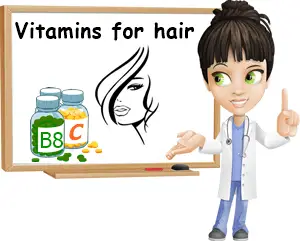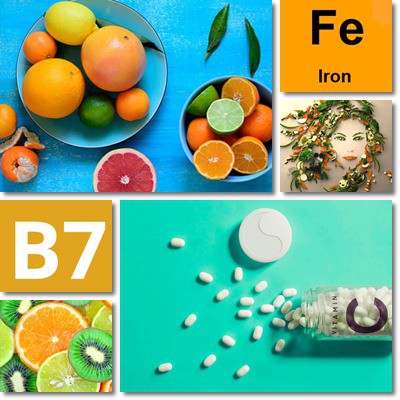Healthy hair is a balanced mix of good nutrition and a proper hair care routine, both of which rest upon sound knowledge of our hair’s nutritional requirements because, just like the rest of our body, our hair lives off and thrives on good nutrition and a sufficient intake of fatty acids, vitamins and dietary minerals.
Poor hair growth, thin, dull, brittle hair, scalp problems such as dandruff or flaky skin are all signs our hair is not in good health and each symptom hints at a particular nutrient deficiency.
While using conditioner and applying intensive hair treatments helps with damage repair and can make our hair easier to style, it will not for example, help it grow healthier, stronger or thicker because these are issues that need to be fixed from the inside with proper nutrition.
A diet deficient in certain key nutrients will lead to problems such as dandruff, scalp irritation, excess sebum production, poor hair growth and quality, which will not go away unless we address them properly.

The best action to be taken when our hair is just not its normal, healthy self is to make sure it gets the nutrients it needs. What vitamins does our hair need? Actually, our hair needs both vitamins and dietary minerals, not to mention proteins and healthy fats.
These micro and macronutrients work together to repair all kinds of damage and make our hair healthy, strong and beautiful. Proteins and healthy fatty acids are a sort of building and repairing blocks, or materials for hair structure.
Vitamins and dietary minerals support the biological processes that work towards achieving stronger, thicker, healthier hair. Most of the vitamins and minerals we need for healthy hair are found in foods rich in protein that are also sources of healthy fats.
Unfortunately we might not always get enough of all the nutrients we need for healthy hair from food alone. Even more, malabsorption problems, eating disorders, junk food or higher nutritional demands can create or further aggravate nutritional deficiencies that deprive our hair of essential nutrients, resulting in damaged hair and other symptoms and overall poor hair quality and appearance.
In such cases, supplementation is needed. Read below and find out what the 6 best nutrients for healthy hair are.

Vitamins and mineral for hair
1) Biotin
Also known as vitamin B7, vitamin B8 or vitamin H, biotin is a B group vitamin required for fatty acid production and synthesis as well as cell growth, among other functions.
The recommended daily intake ranges from 30 mcg to 100 mcg for the average adult, but a tolerable upper limit has not been set due to insufficient data.
Biotin is also called vitamin H because of its implications in regulating hair growth. A more serious deficiency has been found to severely impact skin, hair and nail health, causing side effects such as dermatitis, brittle, flaky nails and substantial hair loss.
Addressing the deficiency by supplying our body with generous amounts of the nutrient reverses these effects and contributes to hair, nail and skin health.
Similarly, increasing our intake of biotin despite technically getting enough of the nutrient (individual needs for certain nutrients may vary immensely from person to person) can contribute to stronger nails and hair and promote hair growth and hair thickness.
Green leafy vegetables such as Swiss chard, almonds, peanuts, salmon, tuna, animal liver are some of the best biotin food sources. Eggs are also a good source, but remember that raw egg white contains avidin, a protein that binds to biotin and reduces its absorption – so no raw eggs.
See my Eggs page and find out the benefits of different egg varieties.
2) Pantothenic acid
Also known as vitamin B5, pantothenic acid is involved in the synthesis of carbohydrates, fats and proteins.
Pantothenic acid contributes to hair health firstly by helping synthesize proteins and fats, two macronutrients that ensure hair structure (our hair shaft is almost entirely made out of protein) and help repair its damaged outer layer.
This prevents the hair from losing moisture, drying out and breaking easily. Because of the nature of its benefits, pantothenic acid might prove more beneficial to hair health when consumed, rather than when applied on the hair directly.
Despite the lack of thorough research, pantothenic acid deficiency has been found to cause hair damage and skin lesions, hence its importance in skin and hair care. Considering its wide availability, a deficiency would however be a very rare occurrence, but age, stress and chronic conditions might increase our daily demands and leave our hair in need of more vitamin B5.
Shiitake and Crimini mushrooms, sweet potatoes, lentils, peas, avocado, chicken and turkey meat are great sources of the vitamin to help us reverse hair damage.
3) Vitamin E
This fat-soluble vitamin is a powerful antioxidant and immune system booster. Normal intake is situated around 15 mg for the average adult, but research has found the human body may tolerate up to 1,000 mg (1 g) of the vitamin without serious side effects.
Vitamin E may be more helpful for hair problems when applied directly on the scalp and length of the hair. Being a sort of natural hair conditioner, it functions as an emollient and as a protective agent, helping regulate sebum production, smoothing hair cuticles and coating the hair shaft so it doesn’t lose moisture, dry out and break easily.
4) Vitamin C
Ascorbic acid is best known for its antibacterial and antiviral properties, but it is also a surprisingly efficient hair vitamin. Vitamin C is a great anti-inflammatory agent and antioxidant. When taken in generous amounts for longer periods of time, it can help counteract hair breakage, regulate scalp sebum production and reduce scalp inflammation responsible for rashes, itching and redness.
Because the most common, richest food sources of the nutrient will most likely not supply more than the minimum recommended daily intake of around 90 mg and considering that research recommends considerably higher amounts, supplementation might be necessary.
In my case, results started showing after about 3 months of taking 1,000 mg of vitamin C daily. That’s when I noticed my hair texture improved and my hair got stronger. While it’s still thin, but that is how my hair has always been, it does’t break easy and I lose very little of it when brushing, unlike when I first started taking vitamin C.
5) Zinc
An essential dietary mineral, zinc is involved in an incredible variety of chemical reactions and functions in the human body, being responsible for cell growth, good immunity, reproductive system health, skin and hair health.
Recommended daily intakes are situated at about 8 mg for women and 10 mg for men. Whole grains, sesame seeds, mustard seeds, pumpkin seeds, sunflower seeds, nuts, liver and red meat in general as well as oysters are generous sources of the nutrient (see benefits of oysters).
Zinc deficiency has been linked to hair loss, scalp problems such as flaky skin and dandruff. Ensuring an adequate intake is believed to promote normal hair growth and scalp health.
6) Iron
As surprising as it may seem, iron contributes to hair health as well. Iron ensures good microcirculation at the scalp level. This means blood is oxygenated properly which allows for nutrients to reach the hair roots and feed our hair. In its own way, iron promotes healthy hair growth. However, taking combined iron and zinc supplements might result in a reduced absorption of zinc, particularly when iron supplements are in generous amounts.
Conclusion
What I can tell you from my experience with hair and vitamins is that it can take time for results to show because vitamins and minerals do not produce immediately visible results. You just have to insist to correct existing nutritional deficiencies or regulate your intake so it meets your individual needs, depending on the situation. But the more time you give your body to balance and repair itself, the more lasting and satisfying the results will be.
